Live Event with Author Ahmad Dallal
Third Arab Social Science Monitor Report
Tuesday, 29 December 2020
10:00 AM EST/5:00 PM EST
Featuring
Ahmad Dallal is Dean of Georgetown University in Qatar. Until Summer 2017, he was a professor of History in the Department of History and Archaeology at the American University of Beirut, where he served as Provost from 2009-2015. Between 2003 and 2009, Dr. Dallal served as chair of the Department of Arabic and Islamic Studies at Georgetown University. He had previously held positions at Stanford University (2000-2003), Yale University (1994-2000), and Smith College (1990-1994).Dr. Dallal has written and lectured widely on a variety of topics, including the Islamic disciplines of learning in medieval and early modern Islamic societies, the development of traditional and exact Islamic sciences, Islamic medieval thought, the early-modern evolution of Islamic revivalism and intellectual movements, Islamic law, and the causes and consequences of 11 September 2001 attacks. He is the author of An Islamic Response to Greek Astronomy: Kitab Ta‘dil Hay’at al-Aflak of Sadr al-Shari‘a (1995); Islam, Science and the Challenge of History (2012); The Political Theology of ISIS, Prophets, Messiahs and the "Extinction of the Greyzone" (2017); and Islam without Europe – Traditions of Reform in Eighteenth Century Islamic Thought (2018). Dr. Dallal earned his PhD from Columbia University in Islamic Studies, and his BE in Mechanical Engineering from the American University of Beirut.
أحمد سليم دلّال عميد جامعة جورجتاون في قطر. عمل قبل ذلك في لبنان والولايات المتحدة، حيث نمت اهتماماته بالأبحاث والتدريس في موضوعات التقاليد الثقافية للعالم الإسلامي. بين عامي 2009 و 2017 شغل الدكتور دلّال منصب أستاذ التاريخ بالجامعة الأمريكية في بيروت. وفي الفترة ما بين عامي 2009 و 2015، عمل كوكيل للشؤون الأكاديمية بالجامعة الأمريكية في بيروت. وقبل ذلك، في الفترة ما بين عامي 2003 و 2009، شغل الدكتور دلّال منصب رئيس قسم الدراسات العربية والإسلامية بجامعة جورجتاون. وقبل ذلك عمل بالتدريس في جامعة ستانفورد، وجامعة ييل، وكلية سميث. تناول الدكتور دلّال مواضيع عديدة في كتاباته وحاضر فيها، من بينها النظم الثقافية في المجتمعات الإسلامية في العصور الوسطى ومطلع العصر الحديث، وتطور العلوم الإسلامية التقليدية والتطبيقية، والفكر الإسلامي في العصور الوسطى، ونشوء وتطور الصحوة الإسلامية والحركات الثقافية في مطلع العصر الحديث، والشريعة الإسلامية، وأسباب وعواقب هجمات 11 سبتمبر/أيلول 2001. للدكتور دلّال مؤلفات عديدة منها كتاب رد إسلامي على علم الفلك اليوناني: كتاب تعديل هيئة الأفلاك لصدر الشريعة (1995) An Islamic Response to Greek Astronomy: Kitab Ta‘dil Hay’at al-Aflak of Sadr al-Shari‘a ؛ وكتاب الإسلام والعلم وتحديات التاريخ (2012) Islam, Science and the Challenge of History؛ والعقيدة السياسية لتنظيم داعش: الأنبياء والمخلصون ومحو المنطقة الرمادية (2017) The Political Theology of ISIS, Prophets, Messiahs and the "Extinction of the Greyzone"؛ ومؤخرا صدر له كتاب بعنوان الإسلام بدون أوروبا – تقاليد الإصلاح في الفكر الإسلامي في القرن الثامن عشر Islam without Europe – Traditions of Reform in Eighteenth Century Islamic Thought 2018. وقد حاز الدكتور دلاّل على شهادة الدكتوراه من جامعة كولومبيا في الدراسات الإسلامية، وعلى بكالوريوس الهندسة في الهندسة الميكانيكية من الجامعة الأمريكية في بيروت.
Bassam Haddad is Director of the Middle East and Islamic Studies Program and Associate Professor at the Schar School of Policy and Government at George Mason University. He is the author of Business Networks in Syria: The Political Economy of Authoritarian Resilience (Stanford University Press, 2011) and co-editor of A Critical Political Economy of the Middle East (Stanford University Press, 2021). Bassam is Co-Founder/Editor of Jadaliyya Ezine and Executive Director of the Arab Studies Institute. He serves as Founding Editor of the Arab Studies Journal and the Knowledge Production Project. He is co-producer/director of the award-winning documentary film, About Baghdad, and director of the acclaimed series Arabs and Terrorism. Bassam serves on the Board of the Arab Council for the Social Sciences and is Executive Producer of Status Audio Magazine and Director of the Middle East Studies Pedagogy Initiative (MESPI). He received MESA's Jere L. Bacharach Service Award in 2017 for his service to the profession. Currently, Bassam is working on his second Syria book titled Understanding The Syrian Tragedy: Regime, Opposition, Outsiders (forthcoming, Stanford University Press).



